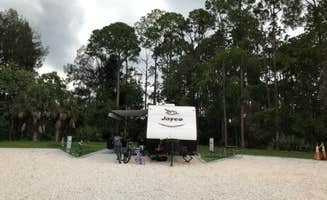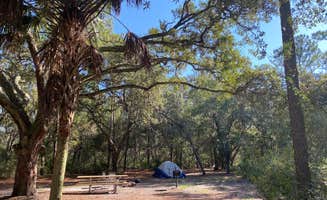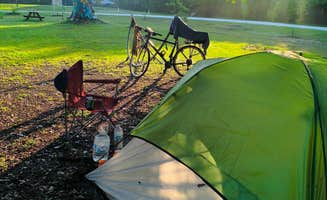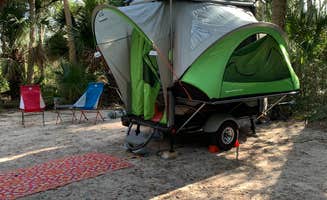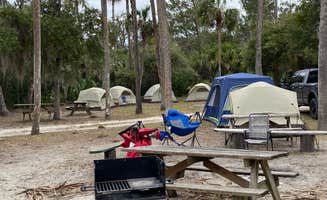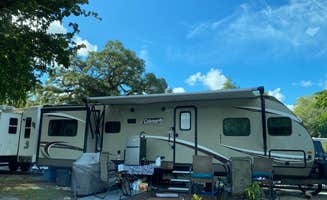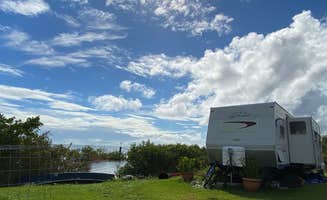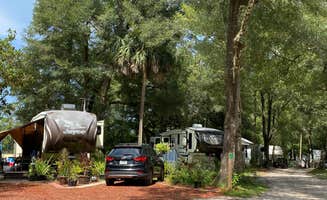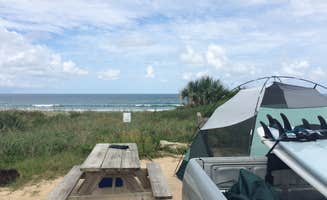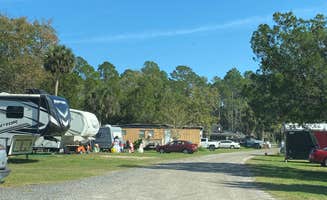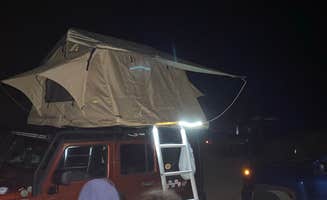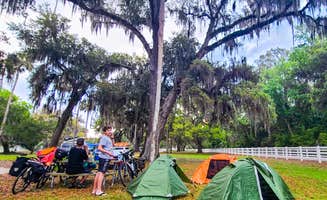Port Orange camping offers direct beach access, natural springs, and river-based activities within a short drive. Campers can select from riverfront sites along the Halifax River system, beachside properties, or slightly inland options with pool access. Winter temperatures typically range from 50-75°F, while summer brings 80-95°F heat with afternoon thunderstorms common from June through September.
What to do
Kayak the Halifax River system: Several campgrounds provide convenient water access for paddlers. At Tomoka State Park Campground, "You can rent kayaks and canoes via the outpost. The sites are private but not far from the neighboring sites," notes Kelly R. The park's location provides access to both river and coastal ecosystems.
Explore Blue Spring State Park: Approximately 30 minutes from Port Orange, this park offers swimming in crystal-clear 72°F spring water. "You can take a river tour as well. There is a path from the campgrounds to the spring. There is a shop on site as well as rentals for canoes and kayaks," according to Jenn B. Winter visitors can see manatees from November through February.
Visit the Daytona Flea & Farmers Market: Located across from Daytona Speedway RV, this weekend market draws campers. "This place is directly across the street from a huge flea market which was fun to walk around on the weekend! They also had a car show going on," reports Tracy J. Open Friday through Sunday with free entry.
What campers like
Beachfront camping access: Oceanside options exist near Port Orange. At Coral Sands RV Resort, "Spot 25, direct view to the ocean. At the beach in seconds. Nice pool on the other side of hotel," shares Cody N. The resort provides both ocean views and beach access directly from the RV area.
Florida-shaped swimming pools: Multiple campgrounds feature distinctive pool designs. "Pool is heated, and shaped like the state of Florida. Nice playground for the kids," says Rodney M. about Sugar Mill Ruins Travel Park. Many parks maintain year-round heated pools due to the region's mild winter climate.
Natural buffers between sites: Privacy remains a priority at several campgrounds despite the region's popularity. "The trees between the spaces were good buffers so you weren't looking right into your neighbors campers," states Marie B. regarding her stay at Tomoka State Park. Vegetation helps maintain a natural camping experience despite close proximity to urban areas.
What you should know
Seasonal considerations: Winter represents peak season with snowbirds filling campgrounds. For manatee viewing at Blue Spring State Park Campground, "Cooler temps best for manatee numbers. Campground sites feel secluded with vegetation but can be challenging for backing up into spots," explains Emily C. Reservations should be made 6-11 months in advance for winter stays.
Cellular and internet limitations: Coverage varies significantly between properties. At Sugar Mill Ruins Travel Park, "The wi-fi repeaters are good for remote workers. This is a paid option and worth it," according to Nell D. However, other campers report weak signals: "None of the carriers have consistent coverage. I have ATT, and most of the time I had nothing."
Train noise at some campgrounds: Rail lines run near several camping areas. At Blue Spring State Park, a reviewer notes, "The only drawback I found from the campsite/campground area was the noise. There are train tracks near the state park, so hearing trains throughout the night (especially at 3am) was not what I'm looking for when I get out into nature. So bring ear plugs!"
Tips for camping with families
Choose parks with kid-friendly amenities: Some Port Orange area campgrounds cater specifically to families. Daytona Beach RV Resort features "Manicured landscape, close proximity to grocers, stores, and not far (15min) to nearest beaches. Beautiful community area includes pool, fire pit, gas grill, tables, & cornholes," according to Kasey M.
Consider off-peak timing: Summer vacation crowds can overwhelm facilities. "Weekends during the summer are VERY busy," warns Zach G. about Blue Spring State Park. Visiting during weekdays or shoulder seasons (April-May or September-October) provides more space and availability.
Look for recreation diversity: Multiple activity options keep children engaged. At Daytona's Endless Summer Campground, "Great family-friendly! This used to be a KOA but now is privately owned and operated. It had a great pool, a playground, and a dog run," explains Kasey M. Many parks offer game rooms, volleyball courts, and organized activities.
Tips from RVers
Site selection matters: The exact location within a park significantly impacts experience quality. At Sugar Mill Ruins, a reviewer advises, "Choose your site carefully. On close inspection, not even sure I want to use the laundromat. Some areas look nicer, but you don't get wifi and cable except at the center hub."
Bring leveling equipment: Many sites feature sandy or uneven terrain. "Must haves: outdoor mat, above ground camp fire ring, longer hoses," recommends Nell D. about camping at Sugar Mill Ruins Travel Park. Sandy pads can shift during rain, potentially affecting RV stability.
Plan for Florida weather fluctuations: Afternoon thunderstorms affect outdoor activities regularly during summer months. "However, this road that we were on does flood during rain, as you see in pictures," notes Kasey M. about Daytona Beach RV Resort. Consider sites on higher ground when booking during rainy season (June-September).


